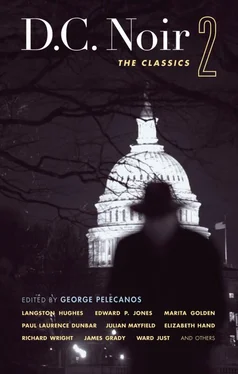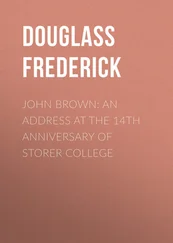Now God knew that for many years white folks had not allowed Negroes in Washington to see any shows — not even in the churches, let alone in theaters! So how come they suddenly thought they ought to be allowed to see God in a white playhouse?
Besides, God was getting paid pretty well, and was pretty well known. So he answered their letters and said that although his ink was made of tears, and his heart bled, he couldn’t afford to get into trouble with Equity. Also, it wasn’t his place to go around the country spreading dissension and hate, but rather love and beauty. And it would surely do the white folks of the District of Columbia a lot of good to see Him, and it would soften their hearts to hear the beautiful Negro spirituals and witness the lovely black angels in his play.
The black drama lovers of Washington couldn’t get any real satisfaction out of God by mail — their colored God. So when the company played Baltimore, a delegation of the Washington Negroes went over to the neighboring city to interview him. In Baltimore, Negroes, at least, were allowed to sit in the galleries of the theaters.
After the play, God received the delegation in his dressing room and wept about his inability to do anything concerning the situation. He had, of course, spoken to his management about it and they thought it might be possible to arrange a special Sunday night performance for Negroes. God said it hurt him to his soul to think how his people were mistreated, but the play must go on.
The delegation left in a huff — but not before they had spread their indignation to other members of the east of the show. Then among the angels there arose a great discussion as to what they might do about the Washington situation. Although God was the star, the angels, too, were a part of the play.
Now, among the angels there was a young Negro named Johnny Logan who never really liked being an angel, but who, because of his baritone voice and Negro features, had gotten the job during the first rehearsals in New York. Now, since the play had been running three years, he was an old hand at being an angel.
Logan was from the South — but he hadn’t stayed there long after he grew up. The white folks wouldn’t let him. He was the kind of young Negro most Southern white people hate. He believed in fighting prejudice, in bucking against the traces of discrimination and Jim Crow, and in trying to knock down any white man who insulted him. So he was only about eighteen when the whites ran him out of Augusta, Georgia.
He came to New York, married a waitress, got a job as a redcap, and would have settled down forever in a little flat in Harlem, had not some of his friends discovered that he could sing. They persuaded him to join a Red Cap Quartette. Out of that had come this work as a Mack angel in what turned out to be a Broadway success in the midst of the depression.
Just before the show went on the road, his wife had their first kid, so he needed to hold his job as a singing angel, even if it meant going on tour. But the more he thought about their forthcoming appearance in a Washington theater that wasn’t even Jim Crow — but barred Negroes altogether — the madder Logan got. Finally he got so mad that he caused the rest of the cast to organize a strike!
At that distance from Washington, black angels — from tenors to basses, sopranos to blues singers — were up in arms. Everybody in the cast, except God, agreed to strike.
“The idea of a town where colored folks can’t even sit in the gallery to see an all-colored show. I ain’t gonna work there myself.”
“We’ll show them white folks we’ve got spunk for once. We’ll pull off the biggest actors’ strike you ever seen.”
“We sure will.”
That was in Philadelphia. In Baltimore their ardor had cooled down a bit and it was all Logan could do to hold his temper as he felt his fellow angels weakening.
“Man, I got a wife to take care of. I can’t lose no week’s work!”
“I got a wife, too,” said Logan, “and a kid besides, but I’m game.”
“You ain’t a trouper,” said another, as he sat in the dressing room putting on his makeup.
“Naw, it you was you’d be used to playing all-white houses. In the old days...” said the man who played Methuselah, powdering his gray wig.
“I know all about the old days,” said Logan, “when black minstrels blacked up even blacker and made fun of themselves for the benefit of white folks. But who wants to go back to the old days?”
“Anyhow, let’s let well enough alone,” said Methuselah.
“You guys have got no guts — that’s all I can say,” said Logan.
“You’s just one of them radicals, son, that’s what you are,” put in the old tenor who played Saul. “We know when we want to strike or don’t.”
“Listen, then,” said Logan to the angels who were putting on their wings by now, as it was near curtain time, “if we can’t make it a real strike, then let’s make it a general walk-out on the opening night. Strike for one performance anyhow. At least show folks that we won’t take it lying down. Show those Washington Negroes we hack them up — theoretically, anyhow.”
“One day ain’t so bad,” said a skinny black angel. “I’m with you on a one-day strike.”
“Me, too,” several others agreed as they crowded into the corridor at curtain time. The actor who played God was standing in the wings in his frock coat.
“Shss-ss!” he said.
Monday in Washington. The opening of that famous white play about black life in a scenic heaven. Original New York cast. Songs as only Negroes can sing them. Uncle Tom come back as God.
Negro Washington wanted to picket the theater, but the police had an injunction against them. Cops were posted for blocks around the playhouse to prevent a riot. Nobody could see God. He was safely housed in the quiet home of a conservative Negro professor, guarded by two detectives. The papers said black radicals had threatened to kidnap him. To kidnap God!
Logan spent the whole day rallying the flagging spirits of his fellow actors, talking to them in their hotel rooms. They were solid for the one-day strike when he was around, and weak when he wasn’t. No telling what Washington cops might do to them if they struck. They locked Negroes up for less than that in Washington. Besides, they might get canned, they might lose their pay, they might never get no more jobs on the stage. It was all right to talk about being a man and standing up for your race, and all that — but hell, even an actor has to eat. Besides, God was right. It was a great play, a famous play! They ought Co hold up its reputation. It did white folks good to see Negroes in such a play. Logan must be crazy!
“Listen here, you might as well get wise. Ain’t nobody gonna strike tonight,” one of the men told him about six o’clock in the lobby of the colored Whitelaw Hotel. “You’d just as well give up. You’re right. We ain’t got no guts.”
“I won’t give up,” said Logan.
When the actors reached the theater, they found it surrounded by cops and the stage was full of detectives. In the lobby there was a long line of people — white, of course — waiting to buy standing room. God arrived with motorcycle cops in front of his car. He had come a little early to address the cast. With him was the white stage manager and a representative of the New York producing office.
They called everybody together on the stage. The Lord wept as he spoke of all his race had borne to get where Negroes are today. Of how they had struggled. Of how they sang. Of how they must keep on struggling and singing — until white folks see the light. A strike would do no good. A strike would only hurt their cause. With sorrow in his heart — but more noble because of it — he would go on with the play. He was sure his actors — his angels — his children — would continue, too.
Читать дальше











